In today’s rapidly evolving transportation landscape, electric trucks have emerged as a significant and environmentally friendly vehicle model. These vehicles play a crucial role in transporting goods and are becoming increasingly widespread due to the rapid development of electric vehicle technology. Today, the author will provide a comprehensive introduction to electric trucks.

Introduction to electric trucks:
Electric trucks are the general term for pure electric trucks. They represent a modern and eco-friendly approach to addressing the need for small cargo transportation in various settings such as factories, docks, and other industrial or commercial locations. These trucks are designed to meet the growing demand for sustainable transportation solutions that reduce environmental impact while still providing efficient and reliable cargo transportation.
At present, the commonly used load tonnage of electric trucks ranges from 0.5 to 4 ٹن. This wide range of load capacities allows them to be suitable for a variety of applications, from transporting light loads in urban environments to handling heavier cargo in industrial settings. The container width of electric trucks is typically between 1.5 and 2.5 میٹر, providing ample space for different types of goods.
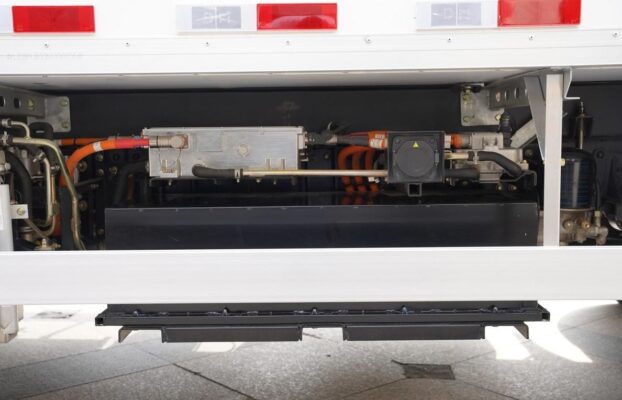
The development of electric trucks is driven by several factors. Firstly, there is a growing concern about environmental issues such as air pollution and climate change. Traditional fuel-powered trucks contribute significantly to air pollution and greenhouse gas emissions. Electric trucks, on the other hand, produce zero tailpipe emissions, making them a more environmentally friendly option.
Secondly, advancements in battery technology have made electric trucks more practical and viable. Modern batteries are capable of storing larger amounts of energy, providing longer ranges and reducing the need for frequent recharging. This has made electric trucks more suitable for a wider range of applications and has increased their appeal to businesses and individuals.
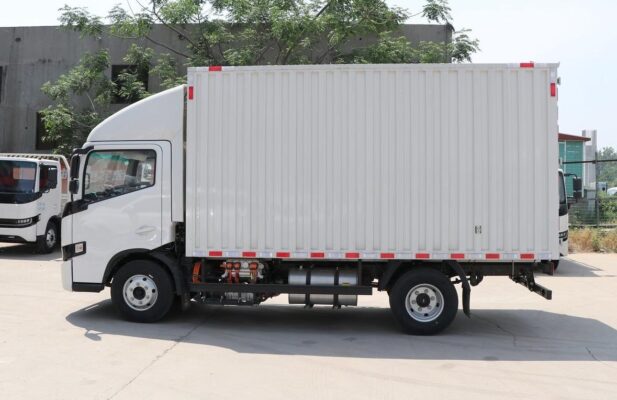
Introduction to electric trucks: Features:
Generally, electric trucks can be customized according to the actual needs of customers. This flexibility is one of the key advantages of electric trucks. Different businesses and industries have unique transportation requirements, and electric trucks can be tailored to meet these specific needs.
مثال کے طور پر, some businesses may require a specific cargo capacity, while others may need a particular configuration of the truck’s body or storage compartments. Electric truck manufacturers can work with customers to design and build trucks that meet their exact specifications, ensuring maximum efficiency and functionality.
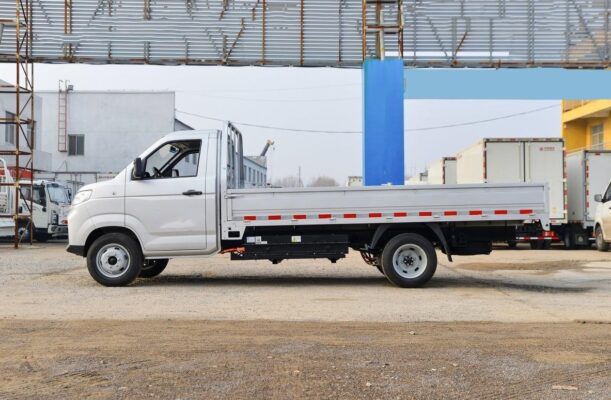
In order to meet the actual needs of customers, most electric trucks adopt advanced foreign motor and control technologies. These technologies offer several benefits. Firstly, they provide large load capacity and strong power. The advanced motors are capable of generating sufficient torque to handle heavy loads, ensuring that the truck can perform its transportation tasks effectively.
Secondly, the advanced control technologies ensure smooth and efficient operation of the truck. These technologies can optimize the performance of the motor, battery, and other components, maximizing energy efficiency and range. They can also provide features such as regenerative braking, which helps to recharge the battery while the truck is in motion and further extends its range.
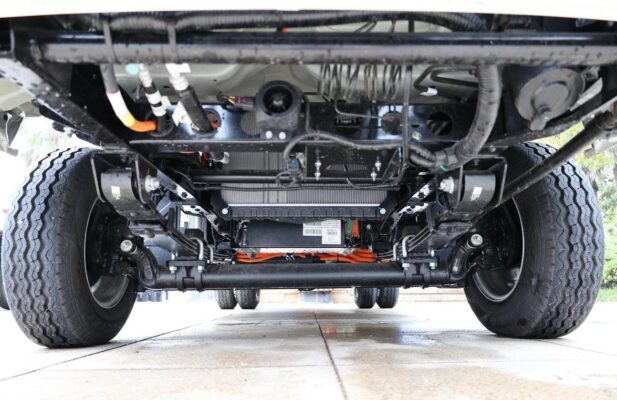
The large-capacity battery is another important feature of electric trucks. This battery ensures its ultra-long cruising range, allowing the truck to cover significant distances on a single charge. For businesses that require long-distance transportation or multiple deliveries in a day, a long cruising range is essential. The large-capacity battery also provides more flexibility in terms of charging options. It can be charged overnight at a depot or during breaks using fast-charging stations, ٹائم ٹائم کو کم سے کم کرنا اور زیادہ سے زیادہ پیداوری.
The super-strong chassis design of electric trucks is yet another feature that enhances their performance and safety. The chassis is designed to withstand heavy loads and rough road conditions. It is made of high-strength materials and is engineered to provide stability and durability. The super-strong chassis design makes the safety performance of electric trucks more stable, reducing the risk of accidents and ensuring the protection of the driver, cargo, and other road users.
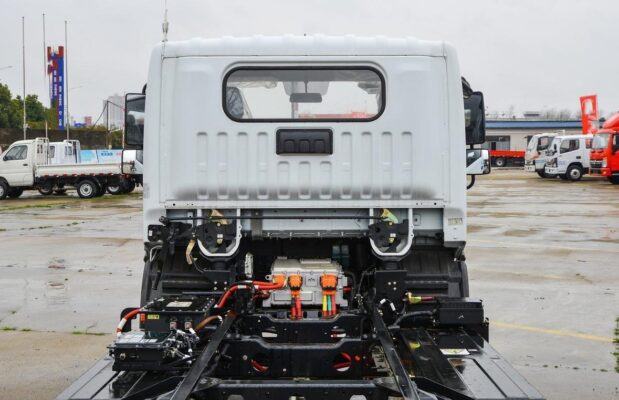
System characteristics and advantages of electric trucks:
Electric trucks are equipped with a professional industrial load-bearing frame. This frame is designed to be rust-proof and anti-corrosive, ensuring its longevity and reliability. In industrial and commercial environments, where trucks are exposed to various elements such as moisture, chemicals, and abrasion, a rust-proof and anti-corrosive frame is essential. The professional industrial load-bearing frame also has a stronger structure, providing additional support and stability to the truck. This makes the service life of electric trucks longer and reduces the need for frequent replacements or repairs.
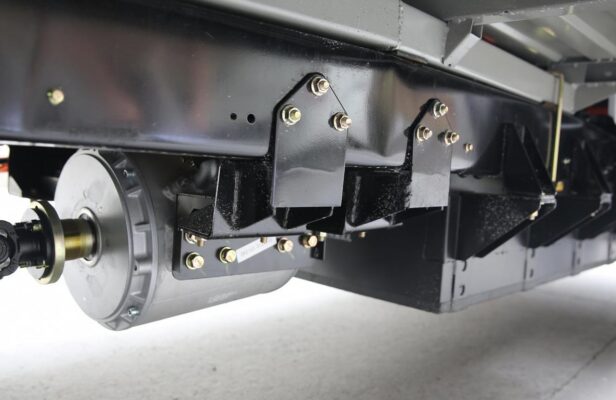
The drive axle of electric trucks has a unique combined rear axle design. This design offers several advantages. Firstly, it effectively reduces chassis vibration and motor noise. Chassis vibration and motor noise can be a significant source of discomfort for the driver and can also affect the stability and safety of the truck. By reducing these vibrations and noises, the combined rear axle design makes driving more enjoyable and less fatiguing for the driver.
Secondly, the reduced vibration and noise also contribute to a quieter and more pleasant working environment. This is especially important in urban areas where noise pollution is a concern. Electric trucks with a combined rear axle design can operate more quietly, reducing the impact on residents and businesses.

Finally, the combined rear axle design can also improve the overall performance and efficiency of the truck. By reducing friction and optimizing the power transfer, it can increase the truck’s fuel efficiency or energy efficiency in the case of electric trucks. This can lead to cost savings over time and make electric trucks a more economical choice.
The above is the electric truck introduced by the author. The appearance of this model has largely solved the serious problem of truck exhaust pollution. Traditional fuel-powered trucks emit a significant amount of pollutants such as carbon monoxide, nitrogen oxides, and particulate matter. These pollutants contribute to air pollution, smog, and respiratory diseases. Electric trucks, on the other hand, produce zero tailpipe emissions, reducing the environmental impact and improving air quality.
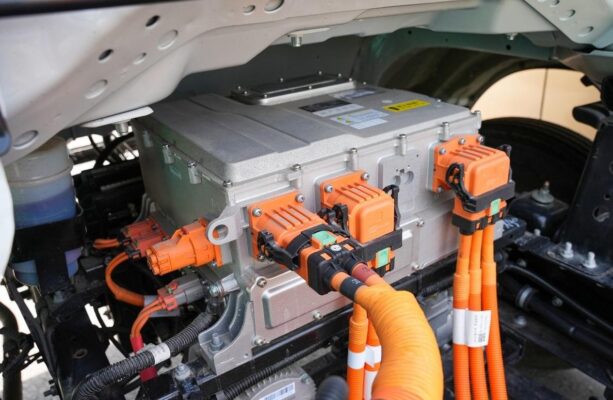
The technology of electric trucks is also progressing and improving. As research and development in the field of electric vehicles continue, new advancements are being made in battery technology, motor efficiency, and control systems. These advancements are making electric trucks more powerful, efficient, and reliable. They are also reducing the cost of ownership and making electric trucks more accessible to a wider range of businesses and individuals.
The above is a detailed introduction to what a van-type electric truck is. Do you know? I believe many people will still have questions. The author will share more dry knowledge with everyone in the future. As the demand for sustainable transportation solutions continues to grow, van-type electric trucks are likely to play an increasingly important role in the transportation industry. Their environmental friendliness, customizability, and advanced features make them a viable option for businesses and individuals looking to reduce their carbon footprint and improve their transportation efficiency.